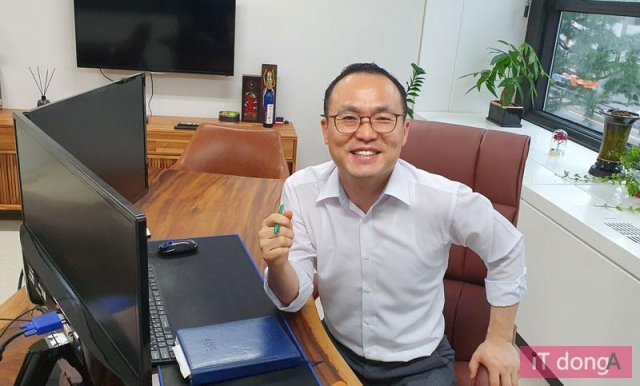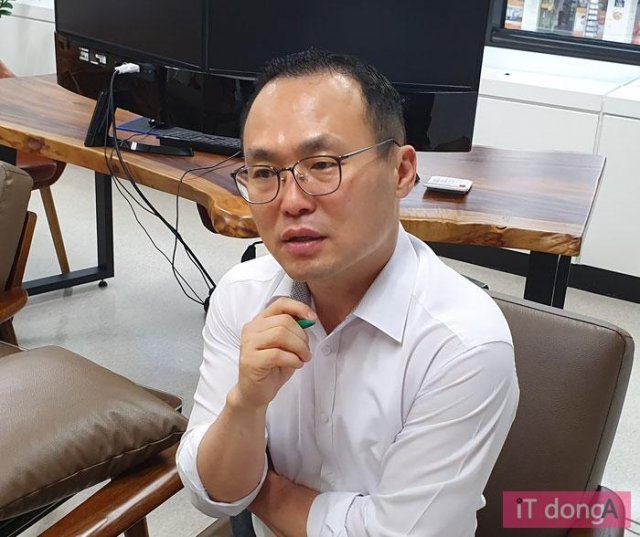대다수는 그렇지 않지만 관청에서 일하는 일부의 공무원들이 민원인들, 특히 외국인에게 불친절한 응대를 하는 걸 종종 봤다. 한국은 국제 교역으로 먹고사는 나라인데 이러면 안된다고 생각한다. 공무원은 나라의 얼굴이기 때문이다. 그리고 이러한 상황에서 한국통합민원센터 같은 기업이 더욱 필요하다고 생각한다. 물론 우리도 아직 고객들이 요청하는 서비스를 전부 제공해드리지는 못하고 있다. 더 분발해서 한층 충실한 글로벌 민원서류 네트워크를 구축, 신속하고 만족스러운 서비스를 제공하는데 최선을 다하겠다.
http://www.donga.com/news/article/all/20191004/97727606/1
(Eng.ver)
[dongA.com] Lee Young-woo, CEO of KICPC, said, "Get Global Integrated Services at a click."

Various certificates are needed for employment, real estate transactions, and start-ups. To get these certificates, you need to visit public offices or you can use the Internet issuance program for another option. But in that case, you need an
accredited certificate of authentication or printer. And in some exceptional cases, the application process is complicated, making it difficult for ordinary people to access. In particular, foreign-related procedures, such as studying abroad, immigration, and establishing foreign corporations, are more complicated because they often encounter language barriers and need to know the various regulations of the countries that are different from Korea.
Established in 2015, KICPC is a startup that operates a 'Delivery of Civil Documents’ service that helps you get domestic and foreign civil documents(including various certificates) quickly and conveniently with a single click on both online and mobile. In particular, it provides a worldwide one-stop service that makes the tricky process(issuance-translation-notarization-apostille or consular legalization-embassy legalization-overseas delivery) simple with minimal effort. IT Dong-A is seeking to find promising startups through joint planning with EnSL Partners, a business accelerator specializing in startup investment, interviewed with CEO Lee Young-woo, who is leading the KICPC.
Q. Please introduce yourself briefly.
I turned 49 this year, and once founded a company called 'On-Off Korea' (2000-2010) to build a search engine and advertise. At that time, On-Off Korea was so popular that more than 300 famous sites including Koreadotcom, iMBC, Sports Chosun, and Fritchel used our search engine and was almost listed on the KOSDAQ. However, there were ups and downs, including a legal battle under pressure and overuse of power from a large portal service provider, and the company shut down. What a sad memory. After that, I joined an association under the Ministry of SMEs and startups to run the company in general, and although I made good results, I felt something was missing. After much consideration, I established KICPC in May 2015 with a capital of 10 million won.
Actually, I didn't mean to start my business again. However, whenever I went to a public office, I often saw many people gather at the civil service room on the first floor to consult with them, especially they had a hard time dealing with foreign civil documents. In the case of e-government in Korea, there was no serious problem, but if you want to submit documents abroad, you have to go through steps such as issuance - translation - notarization – Ministry of Foreign Affairs - embassy certification - and overseas delivery. It takes a lot of time and money to do this myself, and asking someone to do it for you is a nuisance.
And in this process, unexpected issues arise. For example, in other countries, black-and-white print documents that work without any problems will be rejected in China. Because red seals must be stamped there. These minor problems also disrupt important tasks such as inheritance, the establishment of a corporation, and marriage. However, it is impossible to ask other countries to fix such systems. However, this problem will inevitably increase as our society globalizes. So I started a business that could solve this problem.
Q. What is your current business status?
Considering the current number of orders, the proportion of orders from Korea and foreign countries is around 60:40 respectively, and the opposite in terms of sales. KICPC provides services to more than 50 countries, so I think KICPC meets most demands of civil documents from various countries even it exclude some countries where the situation is unstable or trade volume is extremely low. If a Korean had to submit a certification to Argentina urgently, it takes 70 hours to make a round trip and costs a lot of money to stay. However, we provide a "one-stop" service that saves customers time and money enough to get civil documents that pass through required steps to submit with a single phone call or a few clicks. It also has an international network for a “one-stop” service. KICPC is now setting up overseas branches. In the case of Vietnam branch, which has been selected by the Seoul Metropolitan Government as 'Subject to Support for Establishment of Overseas Branch Office' is expected to become a reality within this year.
Customers' reactions to the overall service are very good. Especially those who want to, get a job, or do business abroad rely on us a lot because they are urgent. For your information, it was only six months ago that our company had a promotion and marketing team. This is because its sales growth was so smooth that it doubled every year without any promotion. The company, which started with a capital of 10 million won four years ago, attracted investment last year in recognition of its value of 10 billion won from venture capital.
Q. What are the differences among similar services?
Of course, there have been many companies that have taken over certain tasks before. In particular, if you go to the embassies of major countries, you will see many so-called "visa houses." However, we solve the series of issues, legalization, translations, etc. in one stop, and other companies only deal with the U.S. and a few other countries, but we deal with more than 50 countries around the world, and we add IT platforms to these services. In particular, it is a clear difference that it has established a vast database by digitizing various forms of civil documents around the world. There are only two to three employees in other companies, but we now have 38 and the number will continue to increase.
Q. Is there a unique corporate culture?
Since its establishment, I’ve wanted to create a firm that can contribute to and be respected by society, and a strong organization where employees need each other. And I didn't want to define each employee as simply being in a contractual relationship. In particular, a representative and employees share the profits generated by the company. Each employee is like an owner more than just having a sense of ownership. Thanks to this, employees are well aware of the company's direction and are working most efficiently while keeping the 52-hour workweek principle. And we are a good company for young people to work for. I would also like to say that it was selected by the Small and Medium Venture Business Corporation as one of the top companies in the category of tomorrow for young workers in the first half of this year.
 Q. What message would you like to send to your customers and readers?
Q. What message would you like to send to your customers and readers?
Most of them are not, but I’ve often seen some public officials working in government offices being unfriendly to people, especially foreigners. I thought this should not happen because Korea is a country that makes a living by international trade. And also, public officials are the face of the country. In this situation, I thought more companies like KICPC are needed. Of course, we have not yet provided all the services requested by our customers. But we will do our best to establish a more faithful global network service of civil documents and provide fast and satisfying services.
Source
http://www.donga.com/news/article/all/20191004/97727606/1




